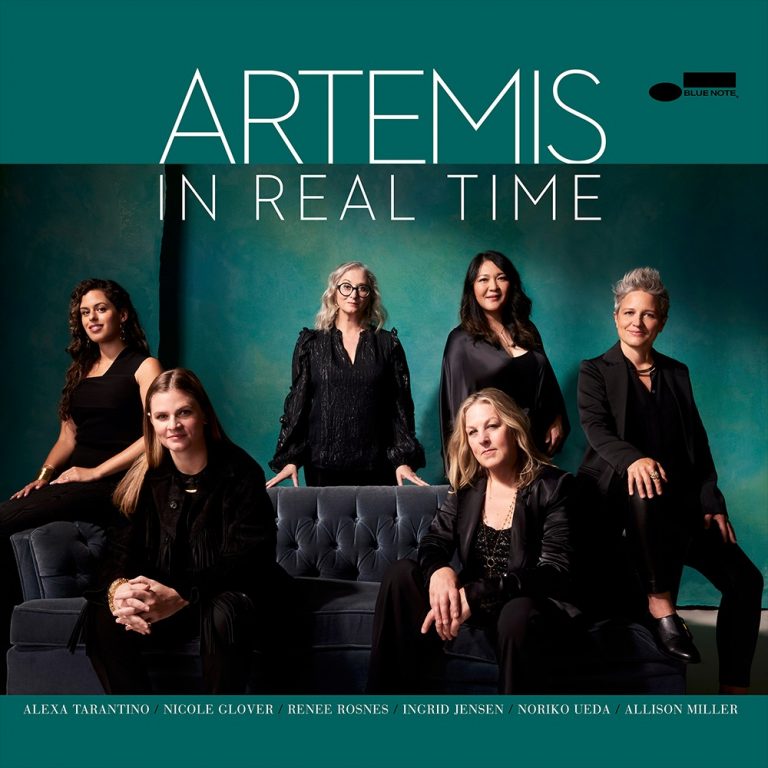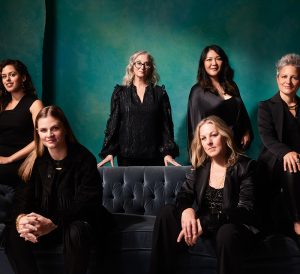Three years after their striking, self-titled debut, ARTEMIS continues to showcase their supergroup credentials with their second album for Blue Note “In Real Time.” With characteristic agility and style, ARTEMIS continues to explore their collective compositional strengths, unique improvisational voices and attentive, imaginative interplay.
This new album features pianist and bandleader Renee Rosnes with trumpeter Ingrid Jensen, bassist Noriko Ueda and drummer Allison Miller, as well as two newcomers – tenor saxophonist Nicole Glover and Alexa Tarantino on reeds, succeeding former members Melissa Aldana and Anat Cohen. Along with the group’s originals, the eight-song album offers re-imaginings of pieces by Lyle Mays and the legendary, recently departed Wayne Shorter.

ARTEMIS In Real Time
Available to purchase from our US store.
ARTEMIS Artemis
Available to purchase from our US store.In advance of their studio sessions, ARTEMIS developed several of the compositions for “In Real Time” during a week-long residency at New York’s fabled club Birdland. “From night to night as we explored the possibilities, the music morphed and grew,” recalls Rosnes, reflecting on the collective spirit that deepens every time they play. “ARTEMIS has been a powerful and affirming experience for me,” reflects Glover. “Making music with this group, I feel total empathetic support and the freedom to be as adventurous and creative as I can imagine.”

Their shared trust and musical chemistry is evident in the opening track, “Slink,” an intricate piece written by keyboardist Lyle Mays, known for his work with Pat Metheny. Rosnes’ expansive new arrangement stratifies lush layers of flute, Rhodes, piano and her own vocals, Jensen shining on trumpet. Miller’s open, swinging original “Bow and Arrow” is reminiscent of the hard bop Blue Note era, while Jensen’s evocative “Timber,” written on British Columbia’s Sunshine Coast, is a double-sided composition: the brighter side, she explains, “is in direct relationship to the earth and the way that timber, in its fully alive state as a tree, uses its superpowers to communicate through its roots and branches,” while the darker, more melancholy side evokes lumberjacks hollering as they fell trees.
Rosnes’ captivating “Empress Afternoon,” an intricate, fast-paced piece that first appeared on her 2002 Blue Note album “Life on Earth” featuring Zakir Hussain on tabla, receives a new rendition. As Miller studied tabla, and has an affinity for Indian music, Rosnes chose to revisit and rearrange the composition, which now bears Miller’s fingerprints. The brightly swinging and intentionally upbeat “Lights Away From Home,” composed by Japanese-born Ueda, was inspired by a meteor shower witnessed on a small, remote island in upstate New York. Tarantino’s oscillating “Whirlwind” opens with the rhythm section free-flowing under the horns, blending beautifully on the melody, each adding a distinct feeling and flavor, here and throughout. Glover’s adventurous nature blends beautifully with Tarantino’s melodic lyricism, layering and interplaying with the veteran Jensen, one of the most remarkable and commanding voices on the scene.
“The single moment is the DNA of eternity.”
Wayne Shorter
The overarching theme of time runs through this sophomore album, introduced in its title. “Music exists in time. Without time, there is no music,” expounds Rosnes. “Photographs and works of visual art are frozen time. Music is liquid time in air.” Reflecting on her own compelling ballad “Balance of Time,” she notes that “composing is improvisation but with the luxury of time and an eraser. . . So the process itself is a balance of time.”
Having recorded and toured with Wayne Shorter, Rosnes contributes an imaginative arrangement of “Penelope,” a ballad first featured on his 1965 recording “Etcetera” (Blue Note). “Wayne’s melodies sound inevitable. There’s an emotional weight to every melodic and harmonic choice,” she says. Concluding the album, this stunning, poignant tribute opens with an aching duet of muted trumpet and piano, the haunting theme leading into Glover’s ephemeral musings on tenor.
Rosnes alludes to Wayne Shorter’s assertion that “music transcends gender” in relating to ARTEMIS as an all-female band. Expressing her wish “that audiences around the world are exhilarated and inspired by the sounds and forget about what gender we are or aren’t,” she points to the power of the music, which speaks for itself. “ARTEMIS is simply one reflection of the global liberation of women across the arts. While it is true that the band. . . initially came together at the request of a promoter who proposed an all-female band to celebrate International Women’s Day in Europe, we are a band today not because of our gender, but because we love and respect one another as people and musicians, and have great chemistry as a musical unit.”
Sharonne Cohen is a Montreal-based writer and editor. Passionate about arts, culture and the creative imagination, she has been a music journalist since 2001, contributing to publications including DownBeat, JazzTimes, Okayplayer, VICE/Noisey, Afropop Worldwide, The Revivalist, and La Scena Musicale. Her photographs often accompany her writing.
Header image: Blue Note Records


